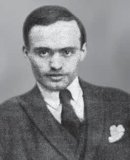Antun Branko Šimić facts for kids
Quick facts for kids
Antun Branko Šimić
|
|
|---|---|
 |
|
| Born | 18 October 1898 Drinovci, Condominium of Bosnia and Herzegovina, Austria-Hungary |
| Died | 2 May 1925 (aged 26) Zagreb, Kingdom of Serbs, Croats and Slovenes |
| Occupation | Poet, journalist, writer and critic |
| Genre | Poetry |
| Literary movement | Expressionism |
Antun Branko Šimić (born November 18, 1898 – died May 2, 1925) was an important Croatian poet. He was known for his unique style called expressionism. Many people think he was one of the most important Croatian poets of the 1900s.
Life of a Young Poet
Antun Branko Šimić was born on November 18, 1898. His family was Croat and lived in Drinovci, near Grude. He went to primary school in his village.
Later, he attended a grammar school in Široki Brijeg. He then moved to other schools in Mostar and Vinkovci. Finally, he continued his education in Zagreb.
In 1917, Antun started his own magazine. It was called Vijavica, which means "Whirlwind." Because of this, he had to leave school. This also meant he lost his parents' financial help. He faced a difficult life and many illnesses.
After Vijavica, he started another magazine called Juriš (Attack). This one also lasted only a short time. He kept writing poems and articles about art. He also translated works from other languages.
In 1920, he published his only collection of poems. It was called Preobraženja, meaning Metamorphoses. He dedicated this book to Tatjana Marinić, whom he met at the university.
Between 1918 and 1919, he spent time in a small village called Dubrava Majići. He stayed in a cottage where his mother grew up. Here, he wrote some of his first expressionist poems. These included "Ja pjevam" (I Sing) and "Ljubav" (Love).
Health and Later Years
Antun Branko Šimić earned very little money. He spent most of his time on his writing. This made his health worse. In December 1923, he went back to Drinovci. He made up with his father there.
When he returned to Zagreb in spring 1924, he started his third magazine. It was named Književnik (Writer). Around this time, he became sick with tuberculosis.
He went to a hospital in Dubrovnik for treatment. He also spent time recovering in a special clinic in Cavtat. But his health quickly got worse after he came back to Zagreb in February 1925. He died on May 2, 1925, in a hospital in Zagreb. He was buried in Mirogoj Cemetery.
His Important Works
Antun Branko Šimić did not write many books in his short life. But some of his poems are very famous. These include "Pjesnici" (Poets) and "Opomena" (Warning). Other well-known poems are "Ručak siromaha" (The Poor Man's Dinner) and "Smrt i ja" (Death and I).
He wrote in a style called expressionism. This meant he used strong feelings and free ways of writing. In Preobraženja, he used "free verse." This means his poems did not always rhyme or have a set rhythm. He wrote in a clear, short, and powerful way.
Sometimes, he used a special type of line with ten syllables. He also used styles from folk songs. His poems often talked about man, pain, and poverty. He also wrote about stars, his home region of Herzegovina, and the poor.
A big topic for him was life and death. He once said, "death is something quite human." In his poem "Warning," he tells people: "Be careful not to go, small as thou are, under the stars, man." He also wrote about mystery in "Poem to a Mountain": "We watch each other silently. Mountain and man. I'll never know where our different meanings meet."
In his magazines, Šimić wrote articles that explained expressionism. His ideas were based on the German Expressionism movement. These ideas influenced his own poetry.
You can see a picture of Antun Branko Šimić on a 20 banknote. This banknote is from the Federation of BiH.
See also
- Antun Branko Šimić Award
 | Janet Taylor Pickett |
 | Synthia Saint James |
 | Howardena Pindell |
 | Faith Ringgold |

